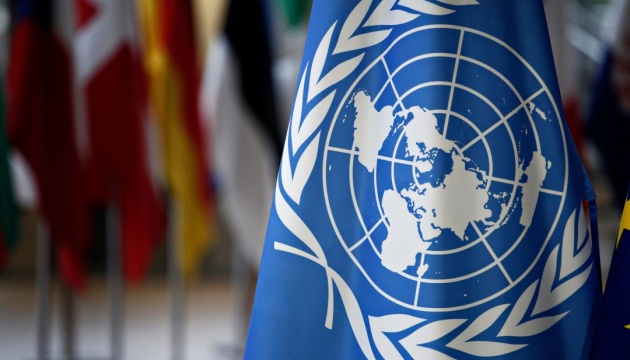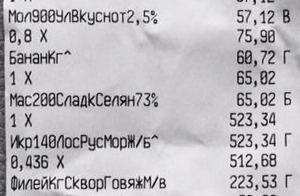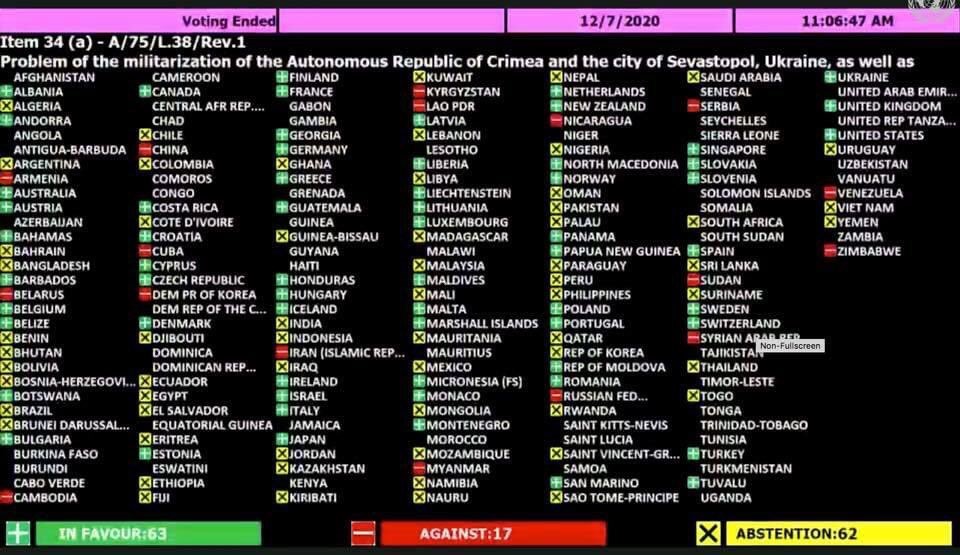"This year we managed to include in the text Russia's responsibility for respecting the rights of Crimean Tatars as the indigenous people of Crimea, as well as the demand to overturn sentences handed down in absentia against the leaders of the Crimean Tatar people, and Crimean Tatars," said Ukrainian Foreign Minister Dmytro Kuleba.
According to UNGA's press release, generated "spirited discussion" before passing. Commenting on the “Ukrainian draft resolution” on Crimea, the Russian representative again repeated major Russian official narratives on Crimea, saying that the peninsula "returned to Russia" as "the result of a free vote" and after it Crimea is ostensibly thriving with a "steady growth" in local budget's revenues, growing housing construction and industrial output. Moreover, according to him in so-called "Russian Crimea — as opposed to Ukrainian Crimea" there is "a clear linguistic equality and diversity." So he labeled the draft resolution on Crimea "a part of an anti‑Russian campaign."
After that, the representative of Ukraine "expressed concern over persistent human rights violations caused by deliberate negligence that undermines international law,"
UNGA says. He once again repeated the internationally recognized fact that since February 2014, Ukraine's Autonomous Republic of Crimea and the city of Sevastopol have been "temporarily occupied by the Russian Federation as a result of armed aggression against Ukraine."
- Read also: New UN resolution on Crimea confirms Russia is an occupying power, brings 10 important changes for Ukraine (2017)
"As the population in the temporarily occupied territory of Crimea faces repression and hopelessness, systematic human abuses have turned Crimea into a land of fear, not a land of tourism, as the Russian delegate said. The indigenous people expelled from their homeland by the Stalin regime have again become a direct target of terror, he underscored," UNGA's press release reads.
Russian objections didn't have an impact on the result of the Assembly's vote and the resolution was adopted by a vote of 65 in favor to 25 against, with 85 abstentions.
- Read also: Why Ukraine’s new UN General Assembly resolution is important for returning Crimea and political prisoners (2018)
Among the countries that voted against the Crimean resolution were the Russian Federation, Armenia, Belarus, Cambodia, China, Cuba, North Korea, India, Iran, Kazakhstan, Sudan, Syria, Kyrgyzstan, the Philippines, Serbia, Venezuela, and Zimbabwe.
By adopting this resolution, the Assembly condemned "efforts by the Russian Federation to legitimize its attempted annexation of Crimea, through the automatic imposition of Russian citizenship, illegal election campaigns, and suppression of national identity."
Ukrainian Foreign Minister Dmytro Kuleba welcomed the UNGA resolution:
Grateful to all member states who supported this document. It further consolidates international support for Ukraine as Russia continues aggressive actions. Very important that the resolution supports the Crimea Platform. Ukraine will further promote this format and its goals 2/2
— Dmytro Kuleba (@DmytroKuleba) December 16, 2021
What's new
For the first time, this year's resolution calls on UN member countries to cooperate within the framework of the newly-created international Crimea Platform.
For the first time, the UNGA resolution calls Crimean Tatars an indigenous people
, highlighting the restrictions faced by Ukrainians, including the indigenous people of Crimea – the Crimean Tatars – in exercising their economic, social, and cultural rights, including the right to work, and the opportunity to preserve their identity, culture, and education in the Ukrainian and the Crimean Tatar languages.
As before, the resolution points out the inadmissibility of politically motivated persecution, torture, and arbitrary detentions and arrests, extrajudicial killings, abductions, and enforced disappearances.
The newly adopted document mentions three new names of Ukrainian political prisoners persecuted by the occupying power:
- pro-Ukrainian pensioner from Sevastopol Halyna Dovhopola,
- freelancer of RFE/RL's project Krym.Realii Vladyslav Yesypenko,
- first deputy chairman of the Crimean Tatar People's Majlis Nariman Dzhelial.
Also, UNGA urges to release two other prisoners, Crimean Tatar human rights activist Emir-Usein Kuku, human rights activist Server Mustafayev, mentioned in UNGA's previous Crimean resolutions.
- Read also: Russia’s replacement of population in occupied Crimea violates Geneva Convention – UN report
According to European Pravda, mentioning the names of specific victims of human rights violations is extremely rare for UN General Assembly resolutions, so the fact that the Assembly focuses on certain people "guarantees attention to their destiny at the highest level in the world, increasing the chances for their release."
The 2018 resolution first mentioned director Oleg Sentsov, activist and farmer Volodymyr Balukh, and Emir-Usein Kuku. The first two were released in 2019. The 2020 resolution mentioned Mustafayev alongside Kuku.
- Read also: Russians relocated to occupied Crimea now make up one-third of the population, experts say
Moreover, the resolution says that Russia's bodies and officials who operate in Crimea are illegitimate and designates them as "the occupation authorities of the Russian Federation."
This years' resolution uses stronger words to condemn the militarization of education in Crimea and militarization of children and youth, as well as on the problem of destruction of Ukraine's cultural heritage in Crimea, illegal "archeological excavations" and illegal transfer of artifacts to Russian territory.
As well, it for the first time stresses the negative environmental impacts of Russian military drills in Crimea and assesses the census conducted there as invalid.
Notably, it places responsibility for providing Crimeans with drinking water on Russia as the occupying state, in line with the Geneva Conventions and contradicting Russia's accusations of Ukraine, which had cut off the water supply from the Ukrainian mainland after Russia occupied the peninsula in 2014.
As before, the resolution concludes that the forcible seizure of Crimea is a violation of international law, and the occupied territories must be returned to Ukraine immediately.
Further reading:
- “After they electrocuted me, I told them everything they needed.” How Russia’s FSB extracted a “confession” from a Crimean Tatar
- Russia continues to coerce Crimeans into its military and punishes those that resist
- Crimean Platform sets the scene for deoccupation, all UN members should join – Ukrainian expert at UNSC
- Russians relocated to occupied Crimea now make up one-third of the population, experts say
- Will the Crimea Platform help Ukraine return Russia-occupied peninsula?
- Forced migration in Crimea as part of Russia's 'hybrid' strategy
- FSB tortures detainees in occupied Crimea as law enforcement goes Soviet-style, UN report confirms
- UNGA vote on militarization of Crimea highlights Moscow’s international isolation on Ukraine, Portnikov says (2020)
- Russia’s replacement of population in occupied Crimea violates Geneva Convention – UN report
- Why Ukraine’s new UN General Assembly resolution is important for returning Crimea and political prisoners (2018)
- New UN resolution on Crimea confirms Russia is an occupying power, brings 10 important changes for Ukraine (2017)
- Russia’s occupation of Crimea led to Ukraine losing 75% of its 2013 GDP
-
Stolen childhood: Russian propaganda and militarization of Crimean youth





